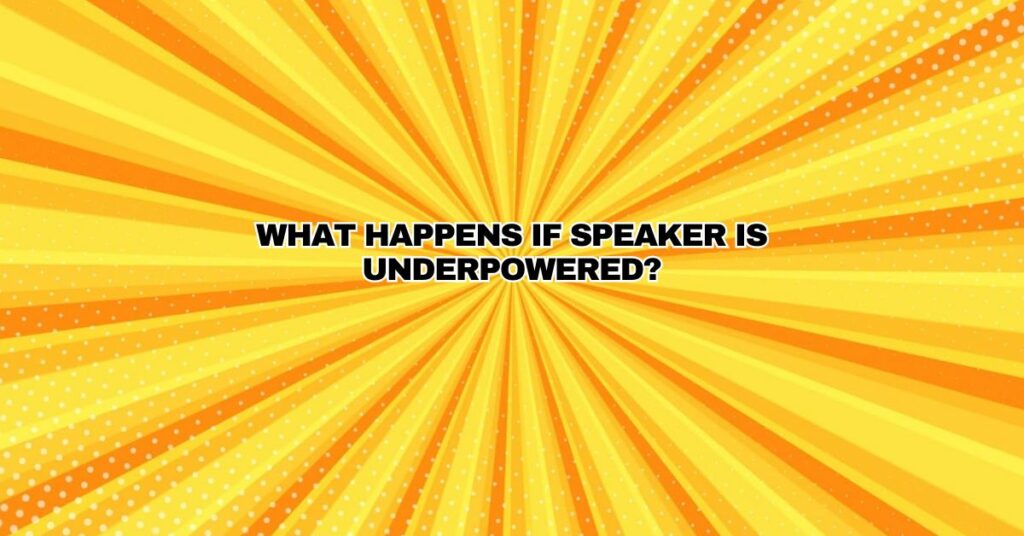Speakers play a pivotal role in reproducing sound, whether it’s music, dialogue, or any other audio content. However, when the power supplied to speakers is insufficient for their specifications and intended use, it can lead to various consequences, impacting the audio quality, speaker health, and even safety. In this comprehensive article, we will explore what happens if speakers are underpowered, the potential consequences, and how to avoid such situations.
Understanding Speaker Power Handling:
Before delving into the repercussions of underpowered speakers, it’s important to understand the concept of power handling. Every speaker, whether it’s a home audio speaker, a car speaker, or a professional PA system, is rated for a specific power capacity, often expressed in watts (W). This rating is known as the “power handling capacity” and it defines the maximum amount of electrical power (in watts) that a speaker can handle without suffering damage. It’s crucial to match the power output of the amplifier or receiver to the power handling capacity of the speakers to ensure optimal performance and longevity.
Consequences of Underpowered Speakers:
- Distortion and Clipping: When a speaker is underpowered, the amplifier may struggle to deliver the required voltage to produce the intended sound. This can result in audio distortion and clipping, where the peaks of the audio signal are cut off, leading to a harsh, unpleasant sound.
- Reduced Volume: Underpowered speakers cannot produce the volume levels they were designed for. This can be a significant issue in live sound reinforcement or home theater setups, where adequate volume is essential.
- Overdriving the Amplifier: In an attempt to achieve higher volumes, users may push the amplifier harder by turning up the volume. This can lead to overheating and potential amplifier damage, as it’s forced to work at or beyond its rated capacity.
- Reduced Dynamic Range: Underpowered speakers may not be able to reproduce the full dynamic range of audio content. This means soft sounds won’t be as clear, and loud sounds may become distorted.
- Loss of Clarity: Underpowering speakers can result in a loss of clarity and definition, particularly in the midrange and high-frequency ranges. Music and speech may lack detail and sound muddled.
- Speaker Damage: Prolonged operation with underpowered signals can lead to speaker damage, particularly if the amplifier clips frequently. Over time, this can cause voice coil overheating, cone damage, and even permanent speaker failure.
- Safety Concerns: Using an underpowered amplifier with speakers designed for higher power can be a safety hazard. If the amplifier is overdriven to the point of failure, it can generate excessive heat and even catch fire.
Preventing Underpowered Speaker Issues:
To avoid the consequences of underpowered speakers, consider the following steps:
- Match Amplifier and Speaker Ratings: Ensure that the amplifier’s power output matches or slightly exceeds the power handling capacity of the speakers. This helps prevent underpowering and the associated issues.
- Use a Powerful Amplifier: If you have speakers with a high power handling capacity, invest in a suitably powerful amplifier. This not only ensures adequate power delivery but also reduces the risk of overdriving the amplifier.
- Speaker Placement: Properly position your speakers to maximize their efficiency. Placing speakers in corners, against walls, or in small, confined spaces can lead to a perceived underpowered effect due to sound reflections and interactions with room acoustics.
- Use a Subwoofer: In systems where low frequencies are critical, adding a subwoofer can help reduce the power requirements of the main speakers, avoiding underpowered situations.
- Monitor Volume Levels: Be mindful of volume levels and avoid excessive use of the amplifier’s gain control. Overdriving the amplifier can lead to underpowered performance.
- Use a Limiter or Compressor: In live sound applications, employ limiters or compressors to control signal peaks and prevent excessive amplifier clipping.
In Conclusion: Optimal Power for Optimal Sound
Ensuring that your speakers receive the appropriate amount of power is essential for achieving the best audio quality, protecting your equipment, and maintaining a safe listening environment. Underpowered speakers can lead to distortion, reduced volume, and potential long-term damage. To avoid these issues, make sure your amplifier matches the power handling capacity of your speakers, and be vigilant about the volume levels to which you subject your equipment. By doing so, you can enjoy clear, powerful, and distortion-free audio experiences while safeguarding your valuable audio gear.

